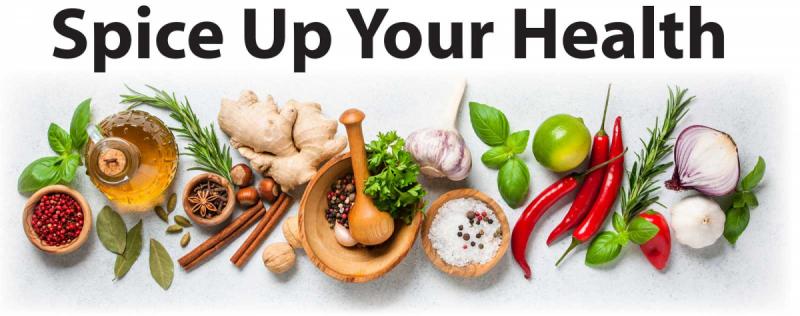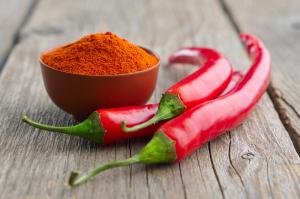

Spices like cayenne, ginger, garlic, horseradish, and black pepper add pungent flavors to the foods people eat every day. As celebrity chef Emeril Lagasee would often say, they “kick it up a notch,” due to their exciting action on our taste buds.
It’s no surprise these spices are called hot, because they have a warming, stimulant effect. What may be surprising is that they also have a cooling effect because they stimulate perspiration. In fact, if you look at where spicy cuisines like Mexican, Indian and Cajun come from, you’ll find that they are all warm, not cold climates.
There are many benefits to adding these spices to your diet or using them as supplements. They’re especially helpful for promoting healthy circulation, digestive function, and fighting off acute viral ailments. We’ll explore more about their health benefits shortly, but first, let’s look at what makes a plant spicy.
What Makes Herbs Spicy?
The spicy nature of pungent herbs is due to the presence of compounds like oleoresins, piperines, sulphides, essential oils, and other compounds which have a stimulating effect on nerve endings. Oleoresins are combinations of a resin and an essential oil, which makes them less volatile. The spicy nature of capsicum and ginger is partly due to oleoresins.
Piperines are alkaloids that produce sharp burning or tingling sensations on the tongue, stimulate saliva, and often have a slight numbing effect. Spices like black pepper derive their pungent nature from piperines.
Various sulphides, compounds that contain sulfur, also produce a spicy sensation. Sulfur is used in detoxification processes and is naturally antibiotic. Mustard, garlic, and onions are examples of pungent herbs whose spicy nature is due to sulfur compounds.
The Health Benefits of Spicy Herbs
 As we previously indicated, the benefits of these culinary spices aren’t limited to the flavor they add to food. They also offer numerous health benefits as follows.
As we previously indicated, the benefits of these culinary spices aren’t limited to the flavor they add to food. They also offer numerous health benefits as follows.
Improving Circulation: Pungent herbs tend to increase blood flow, especially improving peripheral circulation so more blood gets to the extremities of the body. This not only helps tissues have a better supply of blood, it also helps to manage blood pressure. Spices can raise low blood pressure and have a moderate effect on reducing high blood pressure.
In addition, many spices help to balance cholesterol and reduce blood fats by stimulating metabolism. They may even help to reduce (and possibly reverse) the formation of arterial plaque. All this means that eating spicy foods helps reduce your risk of heart disease.
Enhancing Digestion: Spices stimulate the release of saliva and other digestive secretions, which enhances digestive function. They can also improve intestinal motility by stimulating the muscular movements in the intestinal system. This helps to prevent and relieve gas and bloating. They reduce intestinal inflammation and help to prevent small intestinal bacterial overgrowth.
Decongestant and Expectorant Actions: If you’ve ever had your nose run after eating spicy food, you know that spices stimulate the secretion of mucus and help move that mucus out of the lungs and sinuses. This makes them very helpful in relieving respiratory congestion in colds, flu, and other respiratory ailments.
Stimulating Perspiration: As they increase the flow of blood to the extremities, spicy herbs help open up the sweat glands, which helps to cool and detoxify the body. For this reason, they have frequently been used to help relieve fever, an interesting paradox because spices themselves are considered hot or heating, rather than cooling. However, as previously pointed out, it is precisely the countries with hotter climates that tend to eat more spicy food.
Acute Infections: The actions of relieving congestion and promoting perspiration are one reason spices have traditionally been employed in relieving acute infections, especially viral ones like colds and flu. Many also have direct antiviral, antibacterial, or antifungal properties, especially those with oleoresins and sulfur compounds.
Anti-Inflammatory: In another seeming paradox, many of these hot spices actually help to reduce inflammation. Many are also antioxidant. This means they can help to reduce one’s risk of many chronic and degenerative diseases.
Pain Relieving: Many spicy herbs also have an analgesic action, reducing levels of pain in conditions like arthritis. Some, like capsicum, have direct analgesic properties. All of them help to ease pain by improving blood flow to tissues, which brings oxygen and nutrients to promote healing.
Enhancing Longevity: All of this adds up to spicy herbs enhancing one’s general health and perhaps even one’s lifespan. In a 2015 study, it was found that eating spicy food six or seven days a week, lowered mortality rates by 14 percent. That’s a very good reason to want to spice it up.
Additional Resources
Strategies for Health by Steven Horne
Become a Member
Steven Horne's monthly member program is a way for you to get great information about herbs and natural healing to build your herbal business. Including the ability to share issues of Sunshine Sharing like this one. Click here to learn more.
